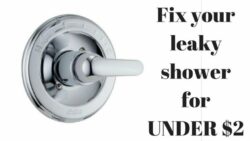Coffee Grounds Clogged Drain
Are you tired of dealing with the same old problem of coffee grounds clogging up your drain? It’s a never-ending battle that can leave you frustrated and annoyed. But fear not, as there are simple solutions to this common issue that can save you time and money in the long run.
If you’re a coffee lover, you know the importance of a good cup of joe to start your day off right. However, the aftermath of brewing coffee can leave you with a sink full of grounds that can cause a headache when it comes time to clean up. But don’t let this problem ruin your morning routine any longer. By implementing a few simple techniques, you can say goodbye to coffee grounds clogging your drain for good.
Use a Filter When Brewing Your Coffee
You should use a filter when brewing your java to prevent any unwanted blockages in your plumbing. With the increasing popularity of reusable filters and eco-friendly options, it’s easier than ever to brew your coffee without leaving any grounds behind. These filters come in different materials, such as metal or cloth, and can be washed and reused multiple times. One popular brewing method that requires a filter is the French press. The coffee grounds are steeped in hot water and then pressed through a metal or cloth filter, separating them from the liquid.
This results in a rich and flavorful cup of coffee, with no grounds left to clog your drain. Moreover, the French press is an excellent choice for those who want to reduce their ecological footprint, as it doesn’t require any paper filters. Using a filter when brewing your coffee not only prevents the clogging of your drain but also improves the taste of your beverage. Filters remove any impurities, oils, and sediment that can affect the flavor and texture of the coffee.
Whether you prefer a classic drip coffee or a more elaborate brewing method, using a filter is a simple and effective way to ensure a smooth and enjoyable experience.
Avoid Pouring Coffee Grounds Down the Drain
Don’t let your morning ritual lead to expensive plumbing problems, opt for composting or disposal in the trash instead. Pouring coffee grounds down the drain may seem like an easy way to get rid of them, but it can cause serious damage over time. Coffee grounds can accumulate in your pipes and cause blockages, leading to clogs and backups.
To avoid this, here are some tips on how to properly dispose of your coffee grounds.
- Composting coffee: Coffee grounds are a great addition to your compost bin. They are rich in nitrogen and other nutrients that can help your garden grow. Mix your coffee grounds with other compostable materials, such as leaves and grass clippings, to create a nutrient-rich compost that will benefit your plants.
- DIY drain cleaners: If you have already poured coffee grounds down the drain and are experiencing slow draining or clogs, don’t panic. You can create a DIY drain cleaner using ingredients you likely already have in your home. Mix equal parts baking soda and vinegar and pour it down the drain. Let it sit for 30 minutes, then flush the drain with hot water. This should help break up any coffee grounds that may be causing a blockage.
- Disposal in the trash: If you don’t have a compost bin or don’t want to create a DIY drain cleaner, you can simply dispose of your coffee grounds in the trash. Be sure to seal them in a plastic bag or container to avoid any mess.
By following these tips, you can avoid the hassle and expense of dealing with clogged drains caused by coffee grounds. So, the next time you finish your morning cup of joe, remember to compost, use a DIY drain cleaner, or dispose of your coffee grounds in the trash. Your plumbing will thank you!
Repurpose Coffee Grounds
Looking for creative ways to repurpose your morning coffee waste? Keep reading to discover how others have used coffee grounds to create a natural exfoliating body scrub, like this DIY coffee scrub recipe that left one user’s skin feeling silky smooth. But did you know that you can also compost your coffee grounds? Not only does it reduce waste, but it also adds nitrogen to your compost, which helps to create a nutrient-rich soil for your plants.
Take a look at this table to see the benefits of both repurposing and composting coffee grounds:
| Repurposing Coffee Grounds | Composting Coffee Grounds |
|---|---|
| Natural body scrub | Adds nitrogen to compost |
| Pest deterrent | Reduces waste |
| Deodorizer | Improves soil quality |
Aside from using coffee grounds for personal care or composting, there are other ways to repurpose them. For example, coffee grounds can be used as a natural pest deterrent. Simply sprinkle them around your garden to keep away unwanted pests. They can also be used as a deodorizer in your fridge or freezer. By placing a small bowl of coffee grounds in your fridge, you can absorb any unwanted odors and keep your food smelling fresh.
Incorporating repurposed coffee grounds into your daily routine not only reduces waste but also benefits your overall health and the environment. So next time you make your morning cup of joe, think twice before throwing away those coffee grounds. Instead, consider composting or finding a creative way to repurpose them. Your skin, plants, and wallet will thank you.
Clean Your Drain Regularly
Start by using natural drain cleaners such as baking soda and vinegar or lemon juice. These alternatives are safer for your health and the environment compared to chemical drain cleaners. If the problem persists, consider hiring a professional to clean your drain thoroughly using specialized equipment and techniques.
Use Natural Drain Cleaners
You can easily keep your drains clear and free of blockage by opting for natural cleaners. Instead of using harsh chemicals that may harm the environment, you can turn to DIY remedies that are eco-friendly and effective. One option is to use a mixture of baking soda and vinegar. Simply pour half a cup of baking soda followed by half a cup of vinegar down the drain. Let it sit for a few minutes before flushing it out with hot water. This combination creates a chemical reaction that can break down any buildup in your pipes.
Another natural drain cleaner you can try is a mixture of salt, baking soda, and hot water. Mix half a cup of salt and half a cup of baking soda and pour it down the drain. Follow this with a cup of hot water. The salt helps to break down any grease or oil while the baking soda neutralizes any unpleasant odors. You can do this once a month to help keep your drains clear. With these eco-friendly options, you can say goodbye to coffee grounds and other debris clogging your drain.
Hire a Professional
If you want to ensure your drains are in top condition and avoid any potential issues, it’s worth considering hiring a professional drain cleaning service. While DIY drain cleaning can save you money, it can also be time-consuming and may not always fix the problem. A professional drain cleaner has the necessary expertise and equipment to properly diagnose and solve any drain issues you may be experiencing. When choosing a drain cleaning service, it’s important to do your research and choose a reputable company with experience in the industry.
Look for reviews and testimonials from previous customers to ensure you’re choosing a company that provides high-quality service. Additionally, make sure the company uses environmentally friendly and safe cleaning products to protect your home and the environment. By hiring a professional, you can ensure that your drains are properly cleaned and maintained, helping to prevent clogs and other issues in the future.
Prevent Future Clogs
To prevent future clogs, start by installing a drain strainer. This will catch any large particles, such as coffee grounds before they have a chance to go down the drain.
In addition, take the time to educate others in your household on proper disposal methods to ensure everyone is on the same page.
Install a Drain Strainer
Pop in a perforated plug to prevent pesky particles from plugging up your plumbing. Installing a drain strainer is an effective way to keep coffee grounds and other debris from clogging your drain. These strainers are small, perforated discs that fit snugly over the drain opening, allowing water to flow freely while catching solid particles. The benefits of using a drain strainer are numerous. Not only do they prevent clogs, but they also help to reduce the amount of waste that goes down your drain.
This can help to extend the life of your plumbing system and reduce the need for costly repairs. When choosing the right strainer, look for one that’s made of durable materials such as stainless steel or silicone. Additionally, consider the size of your drain and choose a strainer that will fit securely over the opening. By taking these simple steps, you can say goodbye to coffee grounds clogging your drain for good.
Educate Others in Your Household
To further prevent coffee grounds from clogging your drain, it’s important to educate others in your household about proper disposal methods. Role-playing scenarios and interactive games can be effective ways to teach others how to properly dispose of coffee grounds and other food waste.
One way to educate others is to create a role-playing scenario where one person pretends to be the coffee drinker, and the other person acts as the person responsible for disposing of the coffee grounds. This can help the coffee drinker understand the importance of not dumping coffee grounds down the drain and the proper way to dispose of them. Interactive games, such as sorting different types of waste into the appropriate disposal containers, can also help others understand the importance of proper waste disposal and how to do it correctly.
By taking the time to educate others in your household about proper disposal methods for coffee grounds and other food waste, you can prevent clogs and other plumbing issues down the line.
This small step can make a big difference in maintaining the health and longevity of your plumbing system.
FAQs
How do coffee grounds clog drains?
Preventing clogging in drains caused by coffee grounds is crucial in maintaining proper plumbing and avoiding costly repairs. The best way to prevent clogging is through proper disposal.
Do not pour coffee grounds down the drain as they can accumulate and create a blockage over time. Instead, dispose of them in a compost bin or trash can. Another method is to use a mesh filter when brewing coffee to trap the grounds before they enter the drain. By following these simple steps, you can avoid the hassle and expense of dealing with a clogged drain caused by coffee grounds.
Can coffee grounds be used as a natural drain cleaner?
If you’re skeptical about using coffee grounds to unclog your drain, you’re not alone. However, contrary to popular belief, coffee grounds can be an effective natural drain cleaner.
Not only are they safe to use, but they can also break down grease and oil that may be clogging your drain. To use coffee grounds as a drain cleaner, mix them with boiling water and pour the mixture down the drain.
Let it sit for a few minutes before running hot water to flush out the drain. Just be sure to avoid using too many coffee grounds, as they can accumulate and cause clogs over time.
With this simple and natural solution, you can say goodbye to the frustration of clogged drains without the worry of harmful chemicals.
What are some alternative ways to dispose of coffee grounds?
To dispose of coffee grounds, you can consider composting them.
Coffee grounds are a great addition to your compost pile as they’re rich in nitrogen, which helps plants grow. To ensure that the coffee grounds break down properly, mix them with other organic materials like leaves, grass clippings, and vegetable scraps.
Once the compost is ready, you can use it to fertilize your garden and improve soil quality. Additionally, coffee grounds can be used as a natural pest repellent and as a mulch to help retain moisture in the soil. By incorporating coffee grounds into your composting and gardening techniques, you can reduce waste and improve the health of your plants.
How often should you clean your drain to prevent clogs?
You may not realize it, but your drain is constantly accumulating debris that can lead to clogs over time. To prevent this from happening, it’s recommended that you clean your drain at least once every few months. You can either opt for a DIY drain cleaning solution or hire a professional drain cleaning service to do it for you. The DIY route involves using a mixture of hot water, vinegar, and baking soda to flush out any buildup in your drain.
However, if you’re dealing with a severe clog, it’s best to leave it to the professionals. They have the proper equipment and expertise to tackle even the toughest drain clogs. So, if you want to say goodbye to the frustration of clogged drains, make sure to keep up with regular drain cleaning maintenance.
Are there any long-term effects of continuously pouring coffee grounds down the drain?
Pouring coffee grounds down the drain may seem like an easy solution, but it can have long-term effects on your plumbing. Over time, the grounds can accumulate and cause blockages, leading to costly repairs. Additionally, coffee grounds are not biodegradable and can harm the environment if disposed of improperly. To avoid these issues, it’s best to dispose of coffee grounds in the trash or compost. By taking this simple step, you can protect your plumbing and reduce your environmental impact.
Congratulations! You’ve successfully learned how to prevent coffee grounds from clogging your drain. By using a filter when brewing your coffee, you can ensure that the majority of the grounds stay out of your drain. Additionally, avoid pouring any remaining grounds down the sink and instead repurpose them for gardening or cleaning purposes. It’s also important to regularly clean your drain to prevent any buildup of coffee grounds or other debris.
And remember, prevention is key to avoiding future clogs. So, take the necessary steps to keep your drain clear and running smoothly. With these tips, you can say goodbye to pesky coffee ground clogs and enjoy your favorite brew worry-free. Keep up the good work!





